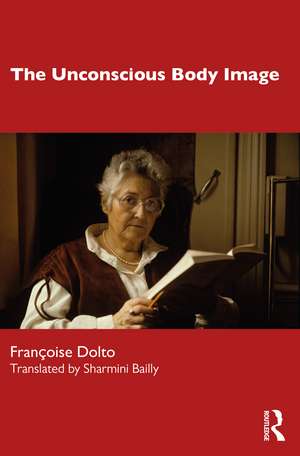The Unconscious Body Image
Autor Françoise Dolto Traducere de Sharmini Baillyen Limba Engleză Paperback – 30 dec 2022
Françoise Dolto describes how unconsciously held mental images of the body and its functioning impact upon the subject’s feelings and ideas of themself, and conversely how emotions and ideas impact upon the body’s functioning by way of these unconscious images. The Unconscious Body Image also presents Dolto’s view of the development of mind in relation to unconscious body images generated at each stage of development (oral, anal, genital, latency and puberty), and ideas about psychic castration at each developmental stage and children’s socialisation, filling a significant gap in psychoanalytic understanding of the mental integration of social law.
This book will be a key text for psychoanalysts in practice and in training, particularly those working with children, psychoanalytic psychotherapists and psychodynamic practitioners in the social sciences, childcare and education.
Preț: 259.28 lei
Preț vechi: 272.93 lei
-5% Nou
Puncte Express: 389
Preț estimativ în valută:
49.63€ • 53.93$ • 41.72£
49.63€ • 53.93$ • 41.72£
Carte disponibilă
Livrare economică 31 martie-14 aprilie
Livrare express 14-20 martie pentru 28.71 lei
Preluare comenzi: 021 569.72.76
Specificații
ISBN-13: 9781032320380
ISBN-10: 1032320389
Pagini: 264
Dimensiuni: 156 x 234 x 22 mm
Greutate: 0.38 kg
Ediția:1
Editura: Taylor & Francis
Colecția Routledge
Locul publicării:Oxford, United Kingdom
ISBN-10: 1032320389
Pagini: 264
Dimensiuni: 156 x 234 x 22 mm
Greutate: 0.38 kg
Ediția:1
Editura: Taylor & Francis
Colecția Routledge
Locul publicării:Oxford, United Kingdom
Public țintă
Postgraduate and ProfessionalCuprins
Introduction 1. The unconscious body image 2. The body images and their destiny: the castrations 3. Pathology of body images and analytic practice
Recenzii
'This is a very welcome, long-overdue translation of the work of one of the foremost French psychoanalysts of the twentieth century, hitherto unavailable for the English reading public. Sham Bailly has done a masterful job of translating the often enigmatic French text. She renders understandable Dolto’s fascinating account of the deepest layers of subjectivity as it emerges in the developmental process. Bailly ‘s introduction enables the reader, familiar with British psychoanalysis, to be open to Dolto’s propositions about how "interpersonal dynamics structure the human mind and in turn how that governs the functioning of the body", without collapsing one into the other.'
Angela Joyce, Adult and Child Psychoanalyst and Chair of the Winnicott Trust, London
'As a child analyst interested in the work of Jacques Lacan and thus also of the French psychoanalysts who worked with him, I have appreciated the work of Dolto and have long regretted that more of it has not been available to Anglo-American readers. This fine translation is a major contribution toward rectifying that lack in the field of child psychoanalysis… The excellent quality of the translation that not only conveys the text clearly and accurately but also manages to capture the distinctive voice and style of Dolto’s writing is also to be commended.'
David Lichtenstein, PhD, Faculty Member, New York University Postdoctoral Program in Psychotherapy and Psychoanalysis; Founding Editor of DIVISION/Review
Angela Joyce, Adult and Child Psychoanalyst and Chair of the Winnicott Trust, London
'As a child analyst interested in the work of Jacques Lacan and thus also of the French psychoanalysts who worked with him, I have appreciated the work of Dolto and have long regretted that more of it has not been available to Anglo-American readers. This fine translation is a major contribution toward rectifying that lack in the field of child psychoanalysis… The excellent quality of the translation that not only conveys the text clearly and accurately but also manages to capture the distinctive voice and style of Dolto’s writing is also to be commended.'
David Lichtenstein, PhD, Faculty Member, New York University Postdoctoral Program in Psychotherapy and Psychoanalysis; Founding Editor of DIVISION/Review
Notă biografică
Françoise Dolto (1908–1988), was an acclaimed French psychoanalyst and paediatrician. In her early career, she was mentored by Sophie Morgenstern, and she later became close friend of Jacques Lacan. She had a regular radio programme on the French national broadcast station France Inter and made many appearances on television and in print.
Sharmini Bailly is a psychoanalytic psychotherapist based in the UK. Her previous books include The Lacan Tradition (Routledge, 2018).
Sharmini Bailly is a psychoanalytic psychotherapist based in the UK. Her previous books include The Lacan Tradition (Routledge, 2018).
Descriere
The Unconscious Body Image espouses a completely original view of the links between physical and psychic development, providing fresh insight into our understanding of psychosomatic symptoms and child development.
